Thorin's Crucible: The Fifflaren Question
Is criticism of Fifflaren, Ninjas in Pyjamas's support player, acceptable and justifiable?
This article was originally published on GameSpot's sister site onGamers.com, which was dedicated to esports coverage.

Thorin's crucible is a regular column in which I address topical or more general matters of concern to myself and the esports community at large.
There is a question in Counter-Strike: Global Offensive which has always circled the game, never able to be truly resolved, and yet which seems as relevant as ever. The question concerns fifflaren, but is not the one most readers are likely expecting. Rather than ask "Should fifflaren be removed from Ninjas in Pyjamas?", the question that has engulfed even that legitimately interesting conundrum is "Is it acceptable to criticise fifflaren?".
lurppis the lightning rod
Since the beginning of CS:GO, fifflaren has been one of the most heavily criticised players, and yet the tide has turned heavily enough now that there is a strong vocal component of the community who turn their ire to those who would criticise fifflaren. The lightning rod for most of this redirected angst has been lurppis, former professional in-game leader of CS 1.6 fame and current CS:GO journalist for HLTV.org and analyst for Dreamhack. Where a mere forum user can be written off by other fans as simply a "hater" or "idiot", the CS:GO community finds itself polarised by repeated criticism of fifflaren, one of the game's most successful players of all time, by one of the game's premiere analysts.
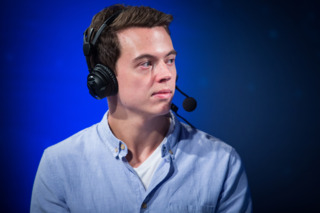
Does lurppis criticise fifflaren out of jealousy over the success the NiP man has acquired for himself, success which largely eluded lurppis in his own playing career? Does lurppis twist facts and figures to his own anti-fifflaren agenda in his articles, analysis and commentary? Such questions have been repeatedly raised and, supposedly, answered in threads that regularly appear after each such bout of criticism from the Finn in the direction of the Swede. Before directly addressing the topic of fifflaren criticism for myself, I will initially address the topic of lurppis himself as a chief critic of the NiP support player's game.
From my many years knowing lurppis, as a professional player, friend and fellow analyst, I've found him to be surprisingly malleable in his set of opinions surrounding professional Counter-Strike. If a conclusion stems from a core principle he holds to be true, then, yes, he may not immediately switch positions, merely on the basis that others have changed their minds or something has seemingly contradicted his core held belief, at least in the short-term.
When results have repeated themselves in either some significant manner or so as to become a recognisable pattern which highlights a change in thinking needed, then I've found him to be one of the first to change his mind, abandoning the pride and hubris which blinds many from changing their minds, and instead following this new intellectual path of thought. This is a primary and vital quality for an analyst to have. Any analyst who can't change his mind and his methods of thinking about the game, so as to keep apace with the ever-changing dynamics of the top teams, the meta-game and latest results, will find himself left far behind and with outmoded perceptions of the game.
At the same time, it's also a very valuable, though seemingly secondary quality, that he is not one to simply change his mind just because a couple of results went counter to his line of thinking about CS. Where the die-hard fanboy out there will refuse to accept almost any amount of evidence and reasoning, there is another, equally extreme fan stereotype of the leaf in the wind, completely thrown from one side to another at a moment's notice, all at the whim of the wind of results. If one team wins, suddenly they're the best in the world, while the team that has lost are slumping and will perhaps never win again against such an opponent. The problem with each of these fan mentalities is that they are different and yet share a place on opposite ends of a spectrum.
The die-hard "loyal" fan is someone who holds certain core truths to be evident and will rationalise himself around any information which arises which may threaten those truths. This fan is not willing to re-examine his beliefs and the logic upon which they are based. Were he, then he might find that he can come to a better understanding of the game, his team or a player were he to change his logic or methods of thinking. On the other end of the spectrum, the leaf in the wind, as it were, is too quick to abandon his logic, never truly constructing a system of analysis and baselines from which to operate. If he made more cemented certain factors and truths, gradually changing them only as time and results demanded, in a more reasonable sense, then he'd be well on the path to becoming an analyst.
The reason I have articulated these fan mentalities, is that lurppis is trapped within neither prison. He is not unduly tied to his original premises, or, even worse, those which seem most pleasing to himself, personally. Likewise, he is also not simply a leaf in the wind, he requires things to be proven with some consistency and for good reasons to be found before his mind is changed. Taking all of that into consideration, I don't think of his criticism of fifflaren as stemming from some personal issue of dislike for fifflaren himself, NiP as a team or the role of the support player. I think that if lurppis says that he thinks fifflaren should or could be removed with positive consequences for NiP and their future, then he means it and has real reasons he can articulate as to why he thinks that way.
I will reference some of lurppis' reasoning and opinions as I unpack the topic itself of criticism of fifflaren and whether fifflaren should actually be a NiP player, going forwards.
Is it acceptable to criticise fifflaren?
It is entirely reasonable to criticise anyone or anything, provided good reasoning is laid out, with a proper chain of argumentation, so that one can see that he making such claims is doing so from a position of rational discussion. Criticism that stems merely from personal dislike or bias is, for obvious reasons, both distasteful and to be avoided, at least by those who which to be able to claim any kind of intellectual status as a rational thinker. I think whenever one sets about criticising something, it is important to examine and articulate how he defines such a thing, so that as he sets about breaking it down and putting it back together, his audience can fall his journey.
An area which often seems unfairly ignored by those who are ardent supporters of fifflaren is that he is more open to criticism than any other player in history precisely because he plays for the greatest team in the game's history. While they might imagine such a fact ensures he should be exempt from criticism, shielded away in a fortress of trophies, over-sized cheques and winner's medals, that fact in reality ensures that we should hold such a player to the highest of standards, indeed, standards beyond those of even other professional players.

When we discuss a player from Dignitas or Titan, the stakes are not as high for such teams in terms of the player's individual performances, since those teams have no shown themselves capable of such incredible feats, at least with the same level of consistency, as NiP have. That NiP are the greatest team of all time is a fact largely propped up by their extensive history of winning early on in the game's life-span. Take away everything before October of 2013 and NiP would still be the best team in the game's history, but not by much and not to the extent that one could imagine them capable of being the unbeatable monsters they were from the beginning of CS:GO to April of 2013, a span of around eight months or so.
The NiP that lost to Virtus.pro immediately showed signs of being beatable by more than just that Virtus.pro team and on that magical day in Kiev, indeed they were a team who could now be bested by a number of teams in the top four or five in the rankings, albeit on those team's absolute best days of play. Going beyond that, you arrived at the NiP of October 2013 through to EMS Katowice, a span of around six months. That NiP was significantly more vulnerable, in fact they were incapable of winning any internationally flavoured LAN tournaments entirely.
The NiP that emerged from the fires of the EMS final against the Poles was revitalised and returned to the top with wins at Copenhagen Games and Dreamhack Summer, as well as some top placings between. Following that, we've had the darkest period in their history, with a slump of event finishes outside of the top four. Finally, we arrive where we are today, with NiP having just won their first and only major title, but by the slimmest of margins imaginable and under incredibly unlikely circumstances.
While the game itself has changed, both in terms of the literal game being played and the meta-game of the styles of play and team rosters, it's not unreasonable to hold NiP to the standard of being the best team in the world at every event. No other team has shown any kind of consistency comparable, as even in the post-October 2013 era, NiP continued to place top four at every event up to ESEA S16 LAN finals, over more than eight months of play, and still remained one of the handful of dangerous teams to take any title before them.
That NiP team, which we haven't seen for a few months, still does not seem distant. How can they get back to that level of consistency? I think it's too simplistic an answer to suggest that it's not in their hands, that the level of play in the other top teams has risen too much to make it a possibility. The level of play of some of the teams has risen, but NiP's has dipped to meet it in the middle. Were any of those teams truly at a world-beating level, then with NiP not winning so many events those teams have been give ample opportunity prove themselves the rightful heirs and tyrants of this era. Instead, we've found ourselves with a set of top teams who all have their event or two to shine and look very strong, only to fall off and underwhelm at following events.
That leaves NiP in a position where they can ask themselves whether or not they are one man away from being firmly on top again for every event, finishing top four at the very worst, or whether they can ride out the storm and return to that position without any changes. That's not an easy question to answer and I'd question the motivations of anyone who thinks they have a simple answer to it and that we should move past it as a discussion topic.
A target on his back, but for good reason

The reason fifflaren is and likely will always be, as long as he remains an active player, the most criticised player is that his position is by far the most tenuous of all the heavily criticised players. If I ask a random fan to provide me with more players they think are open to heavy criticism, I will likely receive names like Ex6TenZ, pronax and Uzzziii. Looking at those players one by one, we see that Ex6TenZ is the only elite level in-game leader in all of France and one of a handful in CS:GO itself, making him indispensable, unless Titan is willing to drastically overhaul their in-game hierarchy and team identity.
pronax, on a lesser scale, plays a similar role, as the tactician and caller of fnatic, a role the Swedish scene finds itself shallow on. He is not a player from whom much skill is required, especially in this new fnatic line-up, as he is there for his mind, the tracking system to direct the missles of his aimers. Replacing him might make fnatic more skilled, but would almost undoubtably make them a worse team and give them less chances to win big titles.
Finally, Uzzziii is a player I think has been very reasonably criticised at times in the past, as well as unreasonably, but who plays in a team that has only shown improved results as the months have gone by, meaning their trajectory makes risking a change in player an unwarranted risk. The question now, becomes how fifflaren figures, contrasted against such names and their contextual circumstances. The answer, as it may not surprise you to discover, based on the tone of this piece, is that he does not come out favourably.
Since NiP have suffered the poorest run of form in their careers, a roster change is very much a viable option for them, since it's not a mere blip on the radar of results which has cost them their run of top fours, but repeated underperformance. Even within the accomplishment of winning their first CS:GO major, we saw the seeds of drastic failure almost germaniate. This is a team which could very reasonably have lost 0:2 in maps in every single round of the playoffs. The old NiP which reached finals might drop a map, but they'd be the ones controlling the course of the series and closing things out. This NiP hung on and just clawed their way back into series where they often lost a map by a much bigger score than they won theirs.
Is fifflaren the indispensable in-game leader of NiP? Certainly not since Xizt embraced that role once more. How about the player that shapes NiP's entire team identity and style, a la pronax? Again, it's very hard to make a case NiP would have to drastically change their approach, best maps and general philosophy on the game with another Swedish player in that spot. Finally, NiP's run of form means that there is no stupidity inherent in considering if another player could fill fifflaren's spot.
What the Ninjas bring to the table
What I've essentially done, on a macro level, with the aforementioned comparison names is ask myself "What do they bring to their teams right now that the team would risk losing if they let them go?". Those simple answers to that question would be "Identity and structure" for Ex6TenZ, "A working methodology" for pronax and "A consistent core headed upwards" in LDLC's case. In fifflaren's case, most of his positives are lagging behind in the days gone by, when NiP were a lock for every top four finish. In this NiP team, the entire team has struggled at different phases in tournaments, where previously they had rocks upon which to base their play.
Previously, those rocks might be the role-playing side of Xizt, friberg and fifflaren, a trio which, if it produced consistency, could keep the ship afloat while waiting for GeT_RiGhT and f0rest to come alive and carry them through big games. Other times, and one must say fairly often in the latter era, it has been the terrifying two-some of GeT_RiGhT and f0rest either simultaneously, as they so famously used to, or individually, destroying opponents and making up for a lack of performance from the others. The problem with the NiP of the past couple of months is that we can't say either set has delivered upon their duties.
GeT_RiGhT, f0rest, friberg and Xizt are all essential components of the identity of NiP. Remove GeT_RiGhT and you not only take away the team's biggest and most consistent weapon, but you likely give another team the best player in the entire world. Toss out f0rest and the team could add in an aggressive aimer, but none will be able to produce the kind of incredible form f0rest can summon when peaking. A streaky player, yes, but indispensable all the same.
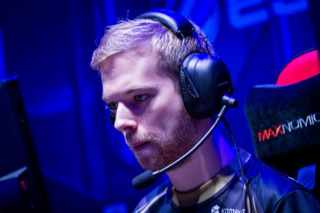
friberg's entry fragging has shown itself to be unparalleled in the Swedish CS:GO scene and has often been a core component of NiP's strong terrorist sides of play. The more rounds friberg can open up to bomb plant situations, the more for GeT_RiGhT and Xizt to win in the clutch. Finally, Xizt is the man who fills holes all around the NiP ship. Need more fragging this game? He can sometimes be the replacement for a f0rest or GeT_RiGhT who is having a rare off-game. Want leadership and a tactical approach, he might not measure up to some of the greatest in the world, but he gives you enough of each to keep NiP heading in the right direction.
Move past those four and look at fifflaren. I think a key point lurppis made to me, in my 'Reflections' interview with him, on the topic of fifflaren's role, is that he is sometimes perhaps oversold in terms of his support role. The most extreme examples of role players, at least in CS 1.6, were those players who, typically because they lacked skill but made up for it in willingness to do what needed to be done, would take all of the least fun roles in the game. I specifically say hardest and not most difficult, because while those roles and positions are very difficult, it's from the sense of being able to put up with the frustrations of being bored, dying often and not having as much say in the frags which cause the success of a round and team.
lurppis made the point that if one looks at the setups NiP uses then actually fifflaren is not forced into all of these roles and positions at all times. In fact, there seem to be maps where fifflaren is put in favourable spots and given jobs which aren't necessarily classifiable as "the dirty work". There are situations and spots in which you will find him filling that niche, but it's not as pronounced as many fans might imagine, should they see him as "the ultimate selfless support player."
Support players of yesteryear
In fact, if I conjure up the names of some of the greatest support players of all time, I end up with a list of players like ceh9 (Na`Vi), ahl (SK.swe) and Loord (PGS/FX). Firstly, each of those players could not only frag a lot better than fifflaren, comparable to their teams and eras, but each contained a core strength which was easily definable.
ceh9's primary strength was that he was probably the most confident role player of all time. He carried in him a firey and unwavering strength that many stars, equipped as they are with their marvelous talents and skills, could no command with such consisteny. With that burning drive, ceh9 could at times keep his Na`Vi team in games or even lead them to victory. He was a role player, there's no doubt about that, but none could match him in this regard.

ahl is often misjudged on the basis of fans not understanding the context of his early history. Yes, the ahl of the SK.swe line-ups was the role player, doing the dirty work and being fifth man down on the totem pole of some truly great line-ups, but that was not forced upon him due to his lacking skill. ahl began his career as one of the stars of some of his early line-ups, such as GoL and 2easy/team9. That ahl was a fragger and middle man, more akin to the role Xizt often plays for NiP now. He embraced the support player role in the SK.swe line-ups, since he was playing with players more skilled or more suited to fragging roles, instead choosing to fill in the blanks their play left.
Finally, Loord was by far the worst fragger of the three listed here. He certainly would have been out of place in a role of more prominence. Indeed, his battle to stake more of a claim in the fragging side of the game often seemed a point of contention with his team-mates. With that said, he fully commited himself to the support role, Loord had the very rare and special quality of being capable of winning big clutch rounds in the biggest games and biggest tournaments. Put Loord in a 1v1 against an opposing team's star player, in the 29th round of the deciding map of a major tournament final, and he seemingly became the favourite each time and could produce miracles.
Stacked up against such names, a fairly unfavourable picture is painted for fifflaren. What overarching strength does he have compared to such figures? What does he do that no one else in NiP could? Here's a, quite serious, challenge for those who would defend fifflaren unquestioningly: take a demo of an average fifflaren game in a big LAN, notice I said an average one and not one of those rare games in which he tops the scoreboard. Take such a demo and watch it only following fifflaren's POV. Now stop the demo each time you see him perform an action or take up a position no other Swedish player outside of NiP could perform or fill satisfactorily.
In the case of ceh9, you'd see rounds where no other Ukrainian player would have had the balls to push on through difficult play and still triumph with an iron will. ahl was always capable of reverting to star mode and putting up a series of big frags, where very few role players have ever had such talent in their back pocket. Finally, Loord could win 1vX in huge tournaments like no other role player in history. What can fifflaren do in games that compares to the prominent strengths of those players?
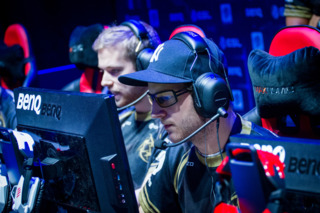
I ask not just as a challenge to the reader's analytical faculties, but also as a genuine point of curiosity. I've undertaken such a challenge myself, during a number of NiP games. I honestly couldn't list you what fifflaren's unique strengths are. For me, he is a serviceable support player, very occasional fragger and, at a real stretch, can come up with the odd clutch round win. I think those qualities are replaceable. I also think you could shift around some of the other players in NiP, even just a little, and then not even necessarily need someone who ticked every one of those boxes.
None of which is to say that fifflaren is a bad player or someone who is not worthy of playing in NiP. Rather, I am making what, I would hope, is a reasonable case for him being less definably irreplaceable, in comparison to the rest of his team-mates and the great support players of all time. The risk of losing fifflaren, in comparison to those others, is not as large as if one of those others had to be sacrificed. The reward is also significantly better if such a move worked out, where it's hard to see how anyone could really improve NiP replacing the others.
I'm not much of a lover of stastistics, since I think they are often misapplied without context and lead people down incorrect or overly simplistic avenues of thought. With that said, it's fairly ignorant that many suggest, without putting much thought into it, that the limited number of frags in a game are the reason fifflaren consistently performs poorly in terms of frags in big tournament games. Firstly, he does and no amount of random fans remembering the odd game in which he topped the scoreboard will change the numbers in the database. Secondly, the drop-off from the other four in NiP down to fifflaren is quite significant, so it's nothing to overlook entirely.
With all of that said, I will now address some of the qualities fifflaren can and may bring to the table which do stake a claim for him in this NiP line-up and sit upon the opposite side of the criticism debate.
Intangibles
Now that we've addressed the tangible aspects of fifflaren and support players's games, let's look at what are called the intangibles. The notion here is that there are things a player can do which have an effect on his team winning or losing, but which don't show up in any stats column or in obviously flashy highlight clips. To further explain the concept, I'll give an analogy from the sporting world which illustrates the impact intangibles can have on a match.
In 1998 the Chicago Bulls which entered the playoffs were the two-time defending champions, but they were also a team spread very thin, from having lost a free agent from the previous run to having injuries, they looked much more vulnerable than any of the championship teams of the previous two years. Entering the playoff portion with a much less impressive record, this Bulls team was seemingly always set on a collision course with the Indiana Pacers in the Conference Finals. The Pacers had always been stopped at the Eastern Conference Finals, no matter their best efforts previously.
This time around, it looked to be the Pacers's year, as they had finished only four games behind the bulls in the regular season and were a deep team, in terms of both starting and bench talent. The core of their engine was the three-pointing shooting of shooting guard Reggie Miller, seemingly. The Bulls, however, identified the dynamic which propelled the Pacers as being point-guard Mark Jackson. One of the all-time great assist men, Jackson was the one responsible for running the offense and getting Miller his shots, being as the shooting guard played his game by having to get open from his defender to get good shots off. Without Jackson to provide a multitude of good shots, you could limit the Pacers's most dangerous weapon, not to mention their entire offensive game.
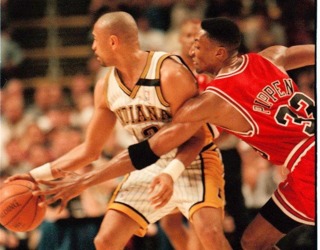
Identifying such a weakness is something that might have been possible for any of the elite teams, but the problem lay in actually executing a plan to limit that dynamic, to stop Jackson. The Bulls were able to find that solution by taking their small forward, Scottie Pippen, and having him play aggressive man-to-man defense on Jackson, picking up the point-guard the entire length of the court. This hampered his dribbling, as he had little room to work with, limited his passing, as Pippen's long wing-span got in the way of his vision, and ensured he grew increasingly flustered, not used to such intense scrutiny.
In game one of the series, Pippen, one of the best defenders in NBA history, performed his task to near perfection on Jackson, leading to a Bulls victory by six points and with both Jackson and Miller having poor offensive nights, by their standards. While accomplishing all of that, Pippen, the Bulls second leading scorer, managed only four points, on 1/9 shots, a substantial drop from his 19.1 points-per-game regular season average. To someone looking only at the stats sheet, Pippen had one of the worst games of his entire career. To someone watching the game and observing his efforts, he controlled the entire game and the opposing team's effectiveness. That is an, albeit extreme, example of the power of intangibles.
Within the CS:GO world, example of a negative intangible would, quite obviously, be that a player who rages at his team-mates can bring their morale down and even make themselves question their play and spiral down into an even worse state of performance. On the other end of the scale, a team-mate with great presence as a supportive figure and friend can lift his team-mate's spirits and ensure they don't drop off while undergoing hard times. I have no problem believing that fifflaren is a positive force within the booth for NiP, in terms of encouragement and support. He seems as if he has that kind of relationship with the others and personality. That's a definite positive for him.
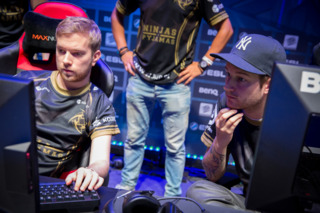
Another intangible is whether or not a player takes roles which someone else could do but would rather not. Again, I do imagine that fifflaren is willing and able to perform such a function for his team-mates. This is a rare quality, as most players in the pro scene are simply worse versions of the star players, wanting to make their imprint on the game merely by fragging and winning rounds that way. It is worth acknowledging that it is rare enough to find players with some skill who are willing to sacrifice for their sides. Again, fifflaren gets good marks in this area.
From my own discussions with fifflaren, it would appear he has a tactical mind for the game, so I have no problem seeing him as a secondary calling figure within NiP. That might mean sometimes contributing ideas before the game or even volunteering key information within the server. In the latter respect, many star players are quite poor, too focused on their individual play, as well they often should be, to properly provide key information for their team-mates. fifflaren has good ground from which to be argued as a valuable part of NiP in this respect.
Finally, there is always a key intangible present in great teams in terms of their chemistry with one another in-game. That's why a stronger player can be inserted, skill-wise, and end up producing inferior results. No one can truly be certain the impact of a player in a line-up until the experiment has been tested in the laboratory of real tournament games. In that respect, the NiP that we currently know is still a product of fifflaren's inclusion, from their strengths to their weaknesses. Whatever he does for NiP, he does something and NiP has won a lot with him as part of their unit, that much cannot be denied.
The question behind the question
When I opened this column up the suggestion that the real question has no longer become whether fifflaren should be in NiP and instead whether one can even make such a suggestion, it's because those who are opposed to him being removed seem to be so firmly set in their ways that they think it's not even a legitimate question to ask if fifflaren could or should be replaced. Now, having addressed many components of those claims, I will actually put forward a position on the original question.
I think now is the first time in the history of NiP where it legitimately might be the better option to replace fifflaren. When they were unbeatable, I thought it would be an utterly crazy and pointless option to exercise. When they were still elite level, but lost to teams playing all-world level CS:GO, then I still felt the potential downside outweighed the benefits of acquiring more skill. Now that NiP is not only vulnerable, but barely what one could describe as a winning top team, I think it's probably a 50:50 call on which the right way to go is.
I've always repeated what I consider to be a core principle of team sports: that you never break up a winning line-up, until it has been proven it can't win any more. That might be slightly too extreme a way to state that point, since I think if you're only winning say one out of 10 events, then already you are still to some degree able to win, just not with enough consistency. Instead, I'd say one should not break up a winning team unless it has significantly dipped below the level its core personnel should be at.
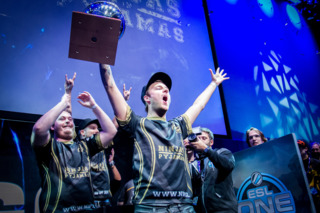
In the case of NiP, they really aren't a winning line-up at the moment. It might not seem that long ago that they were lifting the trophy at Dreamhack Summer, but much has happened in the CS:GO world since then. Even then, that was not a win in which they convincingly dispatched opponents en route to the title, it was very hard fought through the playoffs. Then you go back further, to their Copenhagen Games win, and find that they again had to battle and struggle to take the title. NiP at their best, in this era, has not been a team capable of truly dominating and rolling over elite opponents since as far back as EMS One Katowice.
That their only win of recent was arguably the biggest fluke event victory by an all-time great team, is not something which should be overlooked. I can't think of a major event won by a great line-up in closer fashion than that. When I say closer fashion, sure the Poles of 1.6 won a number of events as the underdogs and battling back into games and winning with close scores, but they were precisely that: underdogs to better elite sides and potentially greater players. NiP had to battle to beat three teams who have all yet to claim any kind of big title with these line-ups. NiP are as barely inside the winning side of the matter as it is possible to get.
Personally, I would still give it a couple of events, as I'm the kind of analyst who wants more data to firm up my conclusions, regardless of my intuitive suggestions. I've yet to be entirely convinced that NiP are incapable of winning more events and putting together sustained runs of top four finishes, which is where I think they should be. With that said, if NiP decided to move fifflaren to coaching role and try their luck with an ex-LGB or flipsid3 player, I wouldn't think them fools.
In short, yes, criticism of fifflaren is both acceptable and justifiable. Not that any conclusion can be said to be obvious and certain as a result of such criticism, so far.
Photo credit: eslphotos, Dreamhack, fragbite
Got a news tip or want to contact us directly? Email news@gamespot.com
Join the conversation